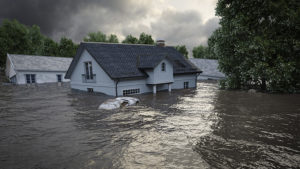Rental property insurance must be a priority among all landlords. But, this type of insurance is not always complete. To ensure full protection, landlords must seek additional coverage.
What Is Rental Property Insurance And What Does It Cover?
Rental property insurance is a form of insurance with protections specifically designed for rental properties. Also known as landlord insurance or rental house insurance, this policy offers three chief protections:
Property Damage
This coverage helps pay for repairs in the event of covered perils such as fire, lightning, hail, and wind. Some policies will further divide this coverage into two: dwelling and other structures. Dwelling coverage applies to the rented home, while coverage for other structures applies to detached structures on the property (such as fences, sheds, etc.).
When looking for a landlord insurance policy, it is best to get one that offers replacement cost for property damage in lieu of actual cash value. This way, you can receive higher compensation even if the damaged item is old.
Liability Protection
This coverage helps pay for legal or medical expenses in the event someone gets injured on the property. The injury typically must have been the result of a maintenance issue, such as structural collapse or slippery walkways. Injury lawsuits can be quite expensive, so it is best to look for rental property insurance that offers comprehensive liability protection.
Lost Rental Income or Rental Default Insurance
This coverage helps pay for lost rent in case your rental becomes completely uninhabitable. Usually, properties become uninhabitable due to termites or other pest infestations, sinkholes, or severe mold. With rental default insurance, you can earn the rent you would have otherwise received if your property was habitable enough to house tenants.
Additional Coverage Landlords Need
Apart from the basic landlord insurance, there are other types of coverage you will need. You will find these below.
1. Guaranteed Income Insurance
Guaranteed income insurance for rental property is paramount, especially if you happen to have a bad tenant. This gives you coverage in case a tenant doesn’t pay their rent for a month or doesn’t pay it in full.
 2. Flood Insurance
2. Flood Insurance
Sometimes, a basic landlord insurance policy will cover damages from floods. Other times, it comes as an add-on. Whether the flood occurs due to a natural disaster or plumbing issues, flood coverage is necessary for landlords to protect their property. This is especially true if the property is located in an area that experiences frequent floods.
3. Earthquake Insurance
Like flood insurance, earthquake insurance is another rider that does not always come with a standard policy. But, earthquakes can cause severe structural damage, so it is better to purchase this add-on as well, especially if the property is in a high-risk earthquake zone.
4. Vandalism Insurance
Properties get vandalized all the time, and rental properties are no exception. Because vandalism coverage is not typically included in your basic landlord insurance, you will need to buy it separately.
5. Burglary Insurance
Basic rental property insurance may cover the cost of repairs in case of a break-in. But, more often than not, the policy won’t cover the cost of the stolen items. This is particularly helpful if burglars steal items that belong to you, the landlord. Some examples include appliances, electronics, and other equipment.
Keep in mind that this won’t cover the cost of replacing the tenant’s stolen belongings. For that, tenants will need a separate policy called renters insurance.
6. Non-occupied Dwelling Insurance
If your property has been left unoccupied for more than 30 days, your insurance provider may not cover any claims you make. As such, if a vacant rental gets robbed, your policy won’t apply. For that, you will need extended protection in the form of a non-occupied dwelling insurance policy.
7. Additional Construction Expenses
It’s normal to have your property repaired after getting damaged. But, in between now and the time your property was first erected, new building codes might have been enacted. If you need to upgrade your property to bring it up to code, this additional coverage can help pay for the expenses.
Landlord Insurance vs Homeowners Insurance
Many landlords may already have homeowners insurance and mistakenly believe it extends to their rental property as well. But, does homeowners insurance cover rental properties?
The short answer is no. While some providers might make exceptions, a majority of them don’t. Homeowners insurance applies to your own place of residence. It might offer some protection if you live in your home and only rent out a room to others. But, if you own and manage a separate rental property, landlord insurance is a must.
There are two main differences between homeowners insurance and landlord insurance:
- When it comes to personal property damage, homeowners insurance typically covers the homeowner’s personal items, whereas landlord insurance only covers those that are used to service the rented property but otherwise belong to the landlord.
- As for liability coverage, landlord insurance only usually offers protection related to the leased property. In other words, if a tenant or guest becomes injured and you’re found liable. But, homeowners insurance generally only applies to you and any family members living with you. Additionally, the injury does not need to have happened in the home.
How Much Does Landlord Insurance Cost?
One thing that scares away most rental property owners from purchasing insurance is its perceived cost. When people think of insurance, they think of an added expense that they will likely never use. But, insurance exists for a reason. You might never use it (if you’re lucky), but at least, in the event that you do need it, it’s there. Landlord insurance can save you a lot of money in the long run.
Landlord insurance, though, typically costs more than homeowners insurance. In fact, according to the Insurance Information Institute, it is about 25% more expensive. Considering the added protections rental property insurance offers, though, this should come as no surprise. On average, landlord insurance costs $1,211 per year.
However, it is worth noting that insurance premiums can vary depending on several factors, such as:
 Coverage amount
Coverage amount- Rental property location
- Size of the rental property
- Condition of the rental property (including the age of the property)
- Number of units
- Add-ons or riders
- Which insurance provider you choose
Some providers will also assess your personal insurance history. This includes past claims you’ve made as well as your credit score.
Shopping for the Best Rental Property Insurance
Because not every provider will give you the same quote, it is important to shop around before committing to a policy. To get the best landlord insurance, search for well-respected providers online or get recommendations from other landlords you know. It is also worth comparing coverage and premiums against each other.
Your current homeowners insurance provider might also offer a bundle option that includes landlord insurance. Bundle options allow you to get a discounted rate if you purchase multiple policies from a single provider.
Get Insured
Rental property insurance is essential to the financial success of your venture. Make sure to protect your assets by purchasing a comprehensive policy from a trusted provider.
Some landlords don’t want to deal with the headaches that come with insurance policies and claims. This is where a property management company can help. Browse Rental Choice’s online directory to look for the best property management company in your area!
RELATED ARTICLES:
- How Can HOA Insurance Affect A Rental Property?
- What Are The Legal Liabilities Of Property Managers
- Water Damage In Apartments: Who’s Responsible For Fixing It?




 Company
Company